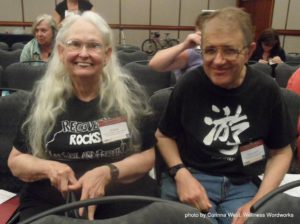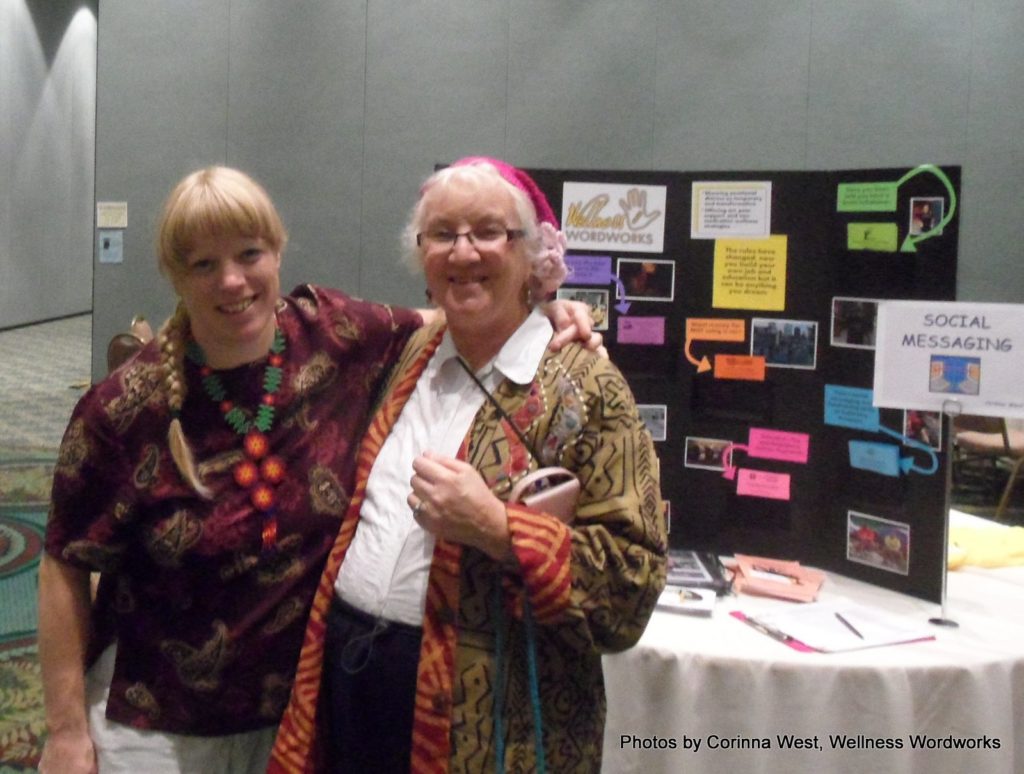One of the issues we face in mental health is that everyone knows the system is broken, but there is no replacement yet. So the question is, what are the mental health design principles to build a replacement? How do you build a functional mental health system that isn’t disease-based, where everyone is viewed as having emotional distress? No one has answered this question with any kind of robustness or scalability yet. This is what we really need to do to make progress in the recovery movement or whatever we call ourselves.

Take a look at this website on scaling social innovations. Help me come up with something scalable and spreadable.
There is a book by C.K. Prahalad called The Fortune at the Base of the Pyramid that talks about how to market products for the very poor, the 2 billion people in the world living off less than $2 a day. The following 12 design principles are adapted from that book.
1. Focus on quantum jumps in price performance.
Sometimes the product must be 30 times cheaper. I think this is the main problem in the recovery movement. All this “Peer support causes 70% hospital avoidance,” heck, we need 7000%. We need a QUANTUM leap in price performance. Could you say, “I can cure your bipolar diagnosis for $200 and it won’t come back?” Seriously say it with proven documentation of outcomes? That’s a QUANTUM leap in price performance.
And we probably CAN prevent mental illness for $200, or help someone in crisis before they get in the system, but it’s SO much harder to extract people once they are in the system. Once they have meds with severe discontinuation syndromes, disease model indoctrination, and sometimes housing and incomes dependent on keeping the mental health label. Extraction at that point is very hard. But what kind of business model could you write for first episode psychosis? What price point could you deliver at, repeatedly, with documentation? Can it be a QUANTUM leap in price/performance?

2. Blend emerging technology with existing technology. Which phone apps are we including in our business model, which video services? How are we integrating tech? Many recovery movement people are still promoting respite care and drop-in centers with no changes to these 30-year-old business models. What is the tech-based solution to these issues? How do you deal with rural people still on dial-up? Are you aware of the digital divide? Can we be part of the Gigabit cities and smart cities movement?
3. Scalable solutions. Many peer-provided programs have higher recovery rates at a lower cost than traditional mental health services, but our programs haven’t grown because they don’t pay for themselves. If your peer program can help 30 people or 300 people, can it help 30,000? Can it help 30 states? What does it take to expand? Temple Grandin, an animal welfare advocate and autism self-advocate, has helped to redesign HALF of the slaughterhouses in the US. You know, where they butcher cows. Basically, keeping cows relaxed during the butchering process saves money, saves staff injury, makes better meat, and is more humane and respectful to the cow. Although comparing a community mental health center to a slaughterhouse may or may not be an appropriate analogy. But what does it take one of us to get to the point where we can say:
“We have redesigned HALF of the community mental health centers in the country!”
SAMHSA has started to promote MCO billing as the holy grail for sustainability, but can it scale up? SAMHSA is funding NAMI (haha) to teach peer-run organizations how to bill MCOs in a fellowship that I am a part of. They said Optum, the leading provider of peer-run contracts, has/had contracts with 27 peer-run organizations in the country. That means there are probably at most 50 or so such contracts in the US. What if there were only 50 lung cancer docs? Only 50 Type II asthma docs in the country? And lots more people have mental health issues. If we only have 50 contracts despite everyone’s really hard work on this, what is wrong? Where is the dialogue on scalability? And why is the leader of this fellowship program shutting down the discussion on scalability? Why does BRSS TACS — Bringing Recovery Supports to SCALE — not talk about scalability? Because SAMHSA told them not to, because the peer-run organizations would “get confused” (personal communication).

4. Reducing resource intensity. Peer supporters at the initial stages of mental health contact mean much lower labor costs. Helping people in their own communities rather than building additional facilities both increases community engagement and reduces building costs. Vikram Patel talks about lay interventions in mental health, and while the talk is pretty disease model, the ideas about “taking it to the streets” are very important. He uses an acronym called SUNDAR to describe how to deliver lay interventions.
5. A deep understanding of functionality. My job is not to get people into the mental health system, my job is to get them out. Complete recovery is our desired outcome, not a lifetime of medications, therapy, supported housing, and charity. Have innovators talked to people in recovery? Do they know about the recovery movement? Just because an advocate has their own recovery story doesn’t mean they are automatically an informed patient-advocate. I like to use the phrase “medical-harm-aware,” or “fully-informed.” The Right Care alliance did a great job of explaining the need to balance harms vs. benefits in all areas of medicine.
Can peer-run organizations really deliver peer support when they are doing advocacy?
How can we sell disruptive innovation to the very people we are trying to disrupt?
6. Process innovations are critical. We are using people that are so recovered that they no longer have contact with the mental health system. Previous mental health design principles miss these “escapees.” Many mental health center-supported peer programs rely on people still on disability or “tame consumers.” Finding “escapees” means that we have role models that have already built a life outside the traditional supports. “Graduates” is another term I like to use, it offends people less than “escapees.” What are other process innovations that are possible? A process innovation means: Peer support is essentially an information exchange and relationship building. There are tons of new ways to deliver information and to build relationships. The old process was brick and mortar drop-in centers — what is a better process?
7. Deskilling work is critical. Can we teach sports coaches, churches, and gardening clubs to deliver peer support? Not the Mental Health First Aid way, which is just to tell people to refer people into the system. But how to actually help people and deliver actual peer support out in the community?

8. Educate customers in product usage. This is the most important part of our mental health design principles. We need to get the word out that recovery is possible, and lots of people can come to a place where they no longer need mental health treatment. This concept is essential.
9. Products must work in hostile environments. Grameen Bank gave very small loans to street beggars and found an excellent repayment rate. Living in disability is tough, and many of our brothers and sisters are homeless or out of touch due to phone or internet bill paying issues. We also have the tendency to drop out of social contacts when we are feeling overstressed. Can your peer support program reach people who are isolated? Diane Engster, a longtime advocate, points out that many peer-run programs can’t even reach out to their own advocate friends who start to struggle and to drop out.
10. Research on interfaces and heterogeneity is critical. Can your program maintain strong contacts with African American communities as well as LGBTQIA (gender identity), women’s, Hispanic, and many of the other oppressed communities in your city and country?
11. Distribution methods designed to reach both highly dispersed rural markets and highly dense urban markets. Have you been to “frontier” regions like Western Kansas where only 5,000 people live in a county the size of some states?
12. Flexible platform to add new features. Who knows what will help people to recover in the future? Is your product a platform or a product?
Which current programs in our country are the best models? Email me if you want to continue this conversation.
I need help getting a scalable model built. I used to study all this stuff and I still struggle with reading. It seems that since my brain injury I haven’t been able to read more than 25 hours a week despite all the painful work I have done on vision rehab. So I am going to start giving away my business development info as much as possible until ONE of us can say they have redesigned half the slaughterhouses in the country. If it’s not going to be me, it needs to be one of us who knows something about medical harm. Email me to be part of my idea-trading brainstorming business development entrepreneurial team.
















Good article Corinna! I have given up on working in “The System.” I see more hope for the recovery model as an underground network.
Number 5 on your list is what I always hoped for in the “Mental Health” System and never found. Pretty angry when I found out the truth about the “meds” they push.
Often I was yelled at or belittled by caseworkers and social workers (occasionally therapists) for wanting to do stuff like marry, have a career, or go to graduate school. Despite my rigid “meds compliance” and “good insight” my uppity attitude frequently led to emotional abuse.
Have you experienced nastiness for teaching recovery?
Report comment
Shame on those who said that to you, Rachel777. It is completely abusive and wrong. What an oppressive and discriminatory environment. I think of Pat Deegan who in speeches said she felt that she could not tell her wish to get her PhD when she was entrenched in the mental system, but she secretly said to herself that she would and did. If you have a preconceived notion and projection onto someone or group, it will definitely negative influence the individual and the relationship. It takes a lot of inner strength and courage to fight it and to leave those oppressors. I am so glad you are out of that environment. I love reading your comments. You have a lot of great thoughts and glad you share them here.
Report comment
Thank you, Knowledgeispower.
My dad has never read Szazs but he mentioned once in frustration that they wanted me to be their grateful slave and not get uppity.
The social workers/case workers/housing directors/clubhouse leaders/other flunkies of the MI System gave me more grief than the shrinks themselves as far as outright abuse. Shrinks and NP’s just give you your pills. If you don’t flip out they can’t even tell you’re tapering I found.
The interfering, nagging b*tches who micromanage your life are horrible! They either have no interpersonal skills or don’t waste them on the “mentally ill.”
Report comment
That does seem to be a big problem with the “mental health professionals.” I too dealt with an insanely delusional psychiatrist who very literally, in the end, declared my entire life to be a “credible fictional story.” Whose medical records imply he thought intelligent women returning to school for their masters degrees were filled with “delusions of grandeur.” Now he knows he’s spent his entire life creating “mental illnesses” in people with his psychiatric drugs, and his DSM “bible” is “invalid.” Meaning he is the deluded and delusions of grandeur filled person.
I hope you’re right, “everyone knows the system is broken.” But I haven’t seen nor heard any talk of true reform or change personally, especially from the doctors. They don’t want to change the system, or stop mass poisoning the children, because “it’s just too profitable,” according to one pediatrician I spoke with recently.
Report comment
“mass poisonning the children”. The mental health theory is as “useful” as racial purity. The gap between real meaning of the human/psyche and the authoritarian system of psychopatic egoic needs is too deep. It is impossibble to change the system. But you can kill those seen as a danger and you can tell the public that they were dangerous. And the danger for today system is a HUMAN, empathy, thinking, gods other than simple happy stupid Apollo.
Normal people are the least psychological so they see no point in changing the system that suits THEIR shallow material needs. The psychological man is a scapegoat for them used to build their importance and sense of morality. In Greece they were scapegoats too, killed for the pleasure of the crowd. Today they are doing it in white gloves, because they are too “civilized” for doing it with bare hands. Today scientists are searching for SUBHUMAN ARCHETYPE, because the are barbarian who thinks psyche means biology. The language is your badge, the more sophisticated it is, the more dangerous you are . The more you know about the barbarism of today language, the more they hate you. And the psychiatry language is the language of the barbaric butchers.
And the book Dear Luise is about today barbarians. Not about the psychiatry, this book is about humans and barbarians. Poeple like Luise should have the memorials commemorating those killed by subhumans, because only subhuman is searching for subhuman archtype among people. Psyche as biology, means flesh replacing human.And people killed by psychiatry are the gods killed by maggots.
I read the last chapter of Re- Visioning psychology yesterday, several times. As long as psyche will be seen as flesh there is no future for human race.
Mental health exists because this is the term using to describe the least psychological archetype. And people who protects mental health policy should be aware of what they are doing with the others, with the psyche.
Psychopathology is a mode of speech.
http://www.terrapsych.com/hillman.html
Report comment
I am againts mental health SHALLOW THEORIES, and even if people talk about so called mental illness, they do not know about what they talking about, because this shallow antipsychological culture destroyed the phenomenology of the psyche. THERE IS NO phenomenological HUMAN BACKGROUND FOR DIAGNOSIS, there is only empty dehumanizing nominalism, false empiricism which give a meaning only to apollonian ego(NORMALCY), as if it was the only archetype of thinking.
So psyche is seen only as evil or disability. This is heresy. Psyche (beyond apollonian ego traits) is not the functional disability, psyche is something which is more than the simple ability to function. To be able to function you must be psychologically shallow, IN LINE WITH APOLLONIAN CLAIMS TOWARD PSYCHE. And apollonian ego archetype which is seen as normalcy is the least psychological archetype….
Psyche haters claims that they are protecting psyche. And how can they do it, when mental health ideology represent only APOLLONIAN EGO FUNDAMENTALISM, and reject the psyche by definition.
MENTAL HEALTH IS A DANGEOROUS IDEOLOGY.
WHAT IS HAPPENINg WITH THE PEOPLE IN THE PSYCHOLOGICAL ARCHETYPES, BEYOND APOLLONIAN EGO assumptions/CLAIMS/ FUNDAMENTALISM? I AM SURE YOU KNOW, THAT. THEY KNOW THAT.
PSYCHOLOGICAL SOCIALISM WITH PSYCHOLOGICAL HIERARCHY AND THE PSYCHOLOGICAL ARCHETYPE AS CURRENCY.
TO UNDERSTAND THIS EVERYONE SHOULD READ RE -VISIONIG PSYCHOLOGY AND CHANGE THE THINKING ABOUT PSYCHE/PSYCHOLOGY.
PSYCHE IS NOT SCIENCE, PSYCHE IS NOT THE SPIRIT, PSYCHE IS NOT THE BRAIN,
PSYCHE IS PSYCHE, MYTHICAL REALITY COMPLETELY REJECT AND DESTROYED BY SCIENTISM, THEOLOGy MEDICINE AND THE OTHERS antipsychological IDEOLOGIES.
PSYCHE IS PSYCHE. AND TO DO ANYTHING GOOD FOR PSYCHE MEANS TO BUILD PHENOMENOLOGY IN THE PLACE OF DSM DEHUMANIZATION AND TO BULID THE RESPECT TOWARD PSYCHOLOGICAL HADES TRAITS.
THANK YOU, FOR READING MY POSTS.
Report comment
No problem.
Report comment
🙂
Report comment
So the system is “broken”? That’s a good start. Now let’s dissemble and discard it! 🙂
Report comment
I have never agreed with the concept that “the system is broken.” The system works quite well. The problem is, we assume that the goals of the system are consistent with point #5 above, to wit: “My job is not to get people into the mental health system, my job is to get them out.” If that’s the goal of the MH system, it’s definitely broken. But if the goal is to increase the number and intensity of “permanent customers” who will never get better but depend on the system and bring in big bucks, well, I’d say the system is pretty darned effective.
Report comment
The Mental Illness System is a great big caregiver with the thing called “Munchausen’s by Proxy.” Get ’em sick and never let them recover.
Report comment
There is an answer in the problem.
System is a mechanism, and given power over true relation, breaks our relation within ourself and between each other.
Systemic defences arise from (and embody) the chaos of our particular version of ‘separation trauma’ – which is not IN the individual so much as in the filed of the collective to which the individual has to learn, adapt and survive in its terms – that is – without meeting rejection, abandonment, betrayal, denial as a powerless subjection in loss of face, loss of self – and loss of world. The making manifest of denied self operates through the denial consciousness that is predicated on lack and fear of loss to seek to evade and escape it’s reoccurrence. Yet this is how to give a positive focus to what we do NOT want and bring it along with us in what is NOT said, allowed, acknowledged or accepted.
The intent and attempt to live out of true and ‘get away with it or make it believable or meaningful’ is largely invisible in an insane society. The forms this takes are becoming significantly less able to be-live in, (for many), and yet the tendency will be to try and smooth over the cracks of an out of true or mistaken identity rather than see the false as false and choose to align in true.
When we open the ‘territory’ of an awakening self-responsibility by walking out of a blame and shame game, we will attract of find support to the degree we are open and willing. We are generally unaware of our own thinking while we are reacting as if it is true. Without a true desire, nothing can reach us. Self-honesty is something our thinking-self fears. Exposure is associated with fear and defended against as ‘selfprotection’ which is reinforced as necessary by (our reaction to) the judgements of others.
Genuine relational communication within ourself as the basis from which to extend and recognize in others, is our step by step acceptance of a greater sanity than a fear-driven society.
Living from a sense of self-lack is a need driven mechanism of conditioned reaction that self-organizes into systems of self-reinforcement and drives the d/evolution and dis-association of a subjective consciousness in social and technological extensions that reinforce the purpose that made them.
The obsession with control drives the demand that systems be in place against our own feared insanity – and inhibition of harm is needful while the thoughts that generate the feeling are brought to light.
But the key is in addressing and undoing the blocks to love’s awareness now – blocks that we are all already participating in. No one can release a habit of which they are neither aware or in ownership of and therefore know not what they do – regardless what the habit-thinking runs.
Mental health is inner peace or lack of self-conflicted identity through which Life knows itself in all that it is.
Mental sickness is always a form of external searching that not only cannot work, but works against the natural acceptance of a true awareness now.
Report comment
I’m not sure my comment can fit within the business model this blog seems to use.
I have a couple of thoughts about alternative consumer-led services for people experiencing distress. They are based on my own narrow experiences of local enterprises.
First, I believe there is a need for training in understanding and eliminating all forms of abuse, and clear accountablilty where consumer or alternative support workers are found to be behaving abusively. I was shocked and hurt to find that my privacy was breached and my confidential information was used to serve the agenda of the worker I reached out to.
When I phoned and politely asked this person to respect my privacy in future and to explain that her actions had undermined me in a very difficult situation, I was met with a wall of psychological abuse that outperformed individual instances of the psychological abuse I was being subjected to within the system. I wished I had a ‘psychological abuse bingo card’ as this person switched from gaslighting, to discrediting, to patronising, to overwriting my experiences, to stating false assumptions about me and the situation as facts, and insisting that her assumptions were more valid that my actual experience and knowledge, including my personal history, to false accusations, to playing therapist, and back and forth until my head was spinning.
I suspect this person learned or honed her craft in this kind of domination and abuse within the system. I recognised the tactics as standard practise for psychiatric personnel in dominating, belittling and disempowering patients.
I fear new services run by those whose primary training for working with oppressed consumers is their own experience of “treatment” abuse run the risk of repeating those experiences from a position of power and that resultant services could easily become a form of “meet the new boss, same as the old boss.”
Second, I worry that the drop-in centre model is too similar to the format of psych services. It seems to be a method of securing funding, but there is an inbuilt inquality. It felt to me that (often) the most privileged ex-consumers used the format as a stepping stone to become ‘better’ (than other survivors) via working their way up to leadership and then having the experience as a CV item on their way to bigger and brighter things.
I also have a sense that the hierarchical structure (formal or informal) can easily lead to assumptions that the steps taken by those who have ‘succeeded’ know best about the lives of others and have the correct formula for all. If survivors want to sell their own formula as a therapeutic approach, I’d rather they did so explicitly rather than implicitly.
Report comment
I prefer to be an escapee, having been told many years ago by a psychologist that I was a fugitive from Mental Health.
Report comment
I admire your efforts Corinna, and always find your pieces thought-provoking. One thing hit me in the gut, though:
I was offended by the notion of “Graduates”- as if the MH system had a curriculum to impart, that if you internalize their “lessons” you will achieve wisdom, insight. Oh HELL no! The better an MH student you are, the more likely they’ll attach that little diploma to your toe!
It is those who Escape the MH system that actually have a chance of achieving something meaningful in their life.
Recovery? (if you even embrace that paradigm; I don’t) is something people do despite the MH system, not because of it. Escapees. I get why it makes them uncomfortable. It ought to.
Report comment
Did Edmund Dantes graduate from the Bastille? What kind of degree did he need to become a count?
Being a “good mental patient” helped me, Lavendar Sage. Because I was responsible about taking my “meds” and obeying other orders–I don’t rebel for the heck of it–they let me go without bugging me when I moved away.
“Rachel, be sure to have your caseworker set you up with a new ‘mental health’ center.”
My CW was overbooked. She mentioned it once; I told her I had set things up myself. She said, “Great.”
I relocated. My folks think my “meds” are needed but hate Day Treatment and other crap. They let me get my pills from a GP nearby. I only took the stuff I needed to keep from whacking out while I tapered.
Have my own place now and a work from home company offering me a job that will pay better than my SSI if I work part time. Subbing/tutoring ESL came in handy after all, despite the MI folks’ efforts to make me attend “Day Treatment” or “Clubhouse” instead.
Off all my pills except for Levothyroxin now. Yay! Over 10 months. My kidneys may be failing. Glad I didn’t wait any longer.
Report comment
It sounds to me like pretending to be a “good mental patient” was useful in making your escape from the system, kind of like the battered spouse pretends to be invested in the day-to-day routines of the marriage whilst laying the groundwork of an escape plan so as not to arouse the abuser’s suspicions. I’m glad you escaped, Rachel. Doing so has allowed you to begin building a life. Where do you think you’d be if you had continued doing what they told you, if you had followed the role model of a “Graduate” of the MH program you were in?
Report comment
Might be diabetic. Lol.
And I was “good.” Till I found out the whole thing was based on a monstrous fraud.
Like Edmund from The Count of Monte Cristo I didn’t graduate. I escaped by playing dead. Wish I could find a small fortune now like he did.
Report comment
I escaped by playing dead.
Profound chunk of wisdom right there, Rachel.
Report comment
Comment removed for moderation.
Report comment
There’s something *ick* about this that I can’t put my finger on, yet I also admire the ambition this post displays. Funny to feel both at the same time.
Perhaps part of the ick-factor is the idea of treating the anti-psychiatry and survivor movements like a startup or product. As an anti-capitalist, I believe that the logic and values underlying “entrepreneurship” (aka “innovation” in a capitalist mode) are poisonous. For me, questioning them is a key part of psychological health and must be a cornerstone of any movement to abolish psychiatry. Neoliberal values will never lead us to a good place. TED talk guru style discourse about “disruption,” “scalability,” and how apps/the internet will somehow save us is just yet another manifestation of very neoliberal values.
However, it is nice to see that someone still believes we can achieve the goals of creating alternatives, getting people out of the harmful existing institutions/programs/meds, and enjoy large-scale cultural shifts in regards to attitudes to normal human difficulties with normal human emotion.
Report comment
Meremortal, any chance I could talk you out of using the word “alternatives”? The term implies that psychiatry is the standard and everything else is an “alternative.” Such as human support. But psychiatry does not provide human support, in fact what it does is often the complete opposite. So why should providing TRUE support be considered an “alternative to psychiatry,” rather than simply fulfilling people’s needs?? Doesn’t that give psychiatry too much credit?
Anyway we don’t need to “replace this thing,” just abandon it.
(PS Oldhead is having trouble posting today so I’m taking his place till the problem is resolved.) 🙂
Report comment
Damn, my alter-ego came through. Turns out my posts have been going into the SPAM file at MIA. Moldhead’s too. 🙂
Thanks to Emily for sorting this out, it’s been a weird couple days.
Report comment
I had that thought, too. It appears that in order to succeed, the effort needs to embrace a “business model” that emulates the very conditions of life that bring about “mental illness” in the first place. I absolutely agree that peer-centered and peer-delivered services (or perhaps “escapee-delivered!”) are going to be much more likely to be helpful. But competing with the “standard services” on a capitalistic basis will ultimately fail, because the Big Behemoths will get upset when they start losing “market share” and crush the upstarts like a bug. I think we have to get at the idea that the current system is motivated by better service delivery and lowering costs (because they aren’t) before we can really set up anything else that would be helpful. It’s a big task!
Report comment
We don’t need to set up an alternative “system” in the sense that we currently have “systems.” People need to learn/be taught to reclaim their own humanity, which includes the capacity to support one another through hard times. But right now “hard times” are supposed to be considered the “norm” rather than the root problem, hence freaked out people are seen as part of the “norm” as well — a steady stream of business with no end in sight, or even any serious hope for such except in the remote future.
Report comment
Good luck with your project. I hope the right people can step up to help you.
Report comment
I hate to bang on about it, but until the professionals wake up to the fact that the drugs are a fraudulent blind alley, I can’t see anything changing because “treatment” is still defined by medication. And the pros will only change when they see consequences coming at them.
If that ever were to happen, they might start looking at a new way to characterise mental distress and the psychosocial ways that work.
Report comment
What is especially frustrating to me is hearing from people who are unsatisfied with their current local service lineup and have a workable idea for a valuable service (let’s say peer-delivered respite care) — but refuse to collaborate with the medical community and with insurance systems to find ways to implement and sustain their own work.
I am someone who recovered after treatment (including medication) in the mainstream mental health system. I support clinicians and care advocates who do the work every day, deliver good results for the people in their care, and respond to the concerns of their patients. But it is also true that in many settings care is sub-par by any standard. When the “recovery community” knows how to fix the system’s flaws, what is the next step? If you consider yourself an advocate or a reformer, what can you do that is practical and positive?
We are missing opportunities to deliver person-to-person help in our society. We hear a lot of lip service about family members and friends supporting and giving comfort to people in crisis, helping to watch out for suicide risk, delivering friendship to combat loneliness. Who will step up and build a way to train up friends and neighbors to deliver informed kindness on demand?
This is America, we live in Capitalism World. Success for an idea usually involves some measure of commercial sustainability. There is economic value around mental health reform. Who has an idea worth funding, and the willingness to make that idea palatable –or actually desirable — to doctors, insurance companies, and the other big political, social, and economic entities that distribute ideas and programs throughout our society? That’s what effective and meaningful reform looks like to me.
Report comment
Komarek I can only work now because I fled the MI System. Not only did the drugs disable me (slept 10-12 hours a day) but the MI folks coerced me into Day Treatment and Case Manager BS to eat up 25 hours a week leaving me no time or energy to work.
They actively discouraged us from working or bettering ourselves. Told us we were sick, helpless and crazy and could never amount to crap.They tore down the smart ones and belittled me for hoping for financial independence. Called me delusional.
Can’t wait to tell Social Security I don’t need their XXXX hand outs now. Like they WANT us economically dependent.
Lived in several cities and towns. Not sure WHERE you live, but it must be far away. No way would the MI System here work with me to help folks, since they want us all crippled and dependent. So I stay as FAR AWAY from those people as possible. They would do all they could to sabotage my independence and drag me into their infantile Clubhouse grown up baby-sitting crap.
I’m actually a capitalist. But crippling and keeping people from employment is unsustainable long term even if the crooks behind it make $$$$ for another decade or two.
Why would they want their livestock to escape? Asking them for help would be suicide for my financial hopes!
Report comment
My dream is a network of survivor coaches. Job coaches, relationship coaches, fitness coaches, financial coaches, etc. to help people flee the Psych Crazy Makers and start life over after 30 or 40.
No good business model though. These fugitives would be penniless. And because of draconian laws it would have to be underground.
XXXX psychiatry and all its filthy lies!
Report comment
komarek,
The medicalization of distress is THE CORE of why people are “unsatisfied,” so why on earth would they appeal to the medical/insurance community to support their programs?! The moment you give them a voice, you are inviting co-optation. Seems the folks you are referring to are aware of this- Good for them! People escaping the fire don’t wanna end up in the frying pan either- it ain’t much of an improvement.
Rachel has the right idea- underground support networks. More power to them!
Report comment
I think you perhaps underestimate the ferocity with which the psychiatric industry protects its own interests. As soon as the “peer service” movement got on its feet, the big guns in psychiatry set out to undermine its credibility and at the same time co-opt such peers as had gotten hired into handmaidens of the psychiatric community. In other words, this is not about the “free market,” but about monopolization of the market by a single, very powerful industry that doesn’t allow for competition. Any ideas that threaten their control over their market, even if these ideas are 100% scientifically and economically viable, or perhaps ESPECIALLY truly viable options, must be shut down at all costs. There are HUNDREDS OF BILLIONS of dollars at stake annually, and those with their snouts in the trough are not willing to give up their free mass feeding without a fight.
Report comment
As soon as the “peer service” movement got on its feet, the big guns in psychiatry set out to undermine its credibility
Keep in mind that the “peer service movement” was CREATED by psychiatry to subvert the mental patients liberation movement. What you describe was Phase II of that effort. Very similar to COINTELPRO in ways.
Report comment
It’s common in oppressive systems to single out certain members of the underdogs to groom as boot licking minions to the overlords by keeping those beneath THEM in line.
Often the minions will be nastier than the overlords themselves.
Report comment
Corinna,
“…Everyone knows the system is broken..” Yes definitely, and it needs to be fixed by spending a lot less money. It’s a no lose situation!
Report comment
By saving money I mean saving what a lifetime of “schizophrenia” might cost.
Report comment
It would be a loss to those Pharma/psych crooks. To the economy as a whole it would though. 🙂
Report comment
From the Book “Selfhood” by Dr Terry Lynch: Page 267: “Case Histories”.
“… I could see how Stephen was diagnosed as having paranoid schizophrenia…”
“…Stephen looked terrified, and I asked him why. He replied ‘I’m not sure I can get out of this place alive’. There were only the two of us in my office, and nobody in the waiting room….”
“…I focused on enabling Stephen to progressively raise his level of selfhood. In particular, I worked with him on self-protection and self-generated security, because his lack of these dominated his life,..”
“..This practise had the desired effect. His level of self-protection and self-generated security began to increase, slowly at first, then gathering pace. Stephen made considerable progress in raising his level of selfhood, of which, for him, self-protection and self-generated security were key factors…”
“.. Because he was doing well, his psychiatrist agreed to reduce his medication slightly, and I subsequently continued the process of gradually reducing Stephen’s medication…”
“..Stephen has been off all schizophrenia medication for over three years. He lives a full life, goes where he likes, thrives in social situations, and has a level of selfhood higher that at any previous time in his life…”
Report comment
Must have been a “misdiagnosis.” You KNOW “Schizophrenia” is incurable! [Hint: that was sarcastic!]
Report comment
Incurable is what people think. But there aren’t that many testimonials around that prove that “it” can be effectively overcome the same way as anything else. Dr Terry Lynch shows us how.
Its not incurable – it doesn’t exist.
Report comment
Nice try! Obviously you are all non compliant! If you were my patients I’d have you so chemically restrained you couldn’t find your keyboard. BRAINS I NEED MORE BRAINS!
Report comment
Don’t come around my place. I have 4 cats I’ll sick on you. 😀
Report comment
Corinna: The “problem”, and the ANSWER, are BOTH so SIMPLE….
Now, with the pseudoscience lies and drugs of psychiatry, we have a “Process-Centered Process”, and a “System-Centered System”.
What we NEED is a PERSON-Centered Process, and a SERVICES-Centered System….
Think about it. Then think about it some more….
Report comment
….person-centered process….
….services-centered system….
….repeat after me….
Report comment
Thank you for the article and excellent advice that is providing there. I want to share my experience of fighting against mental diseases. I use medicine with good quality and have a rest more. I usually order drugs here https://canadianhealthncaremall.com/
Report comment